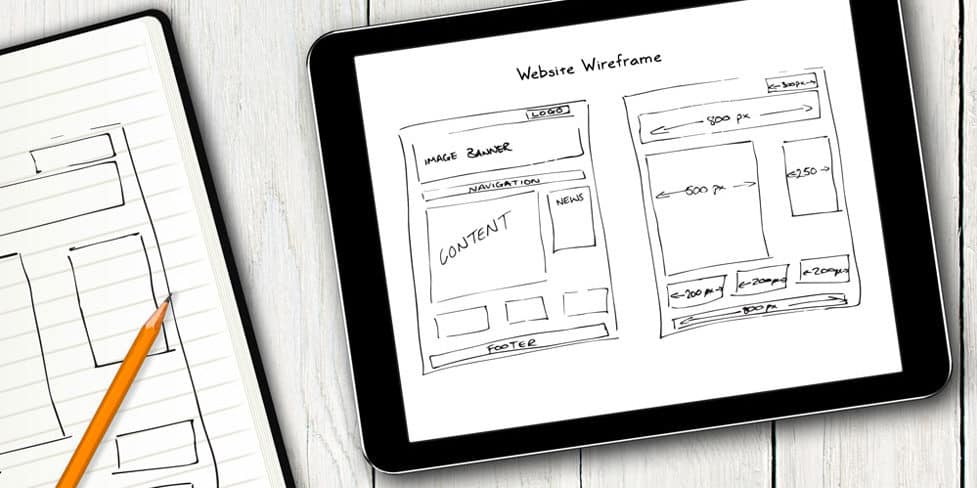Like it or not, we’re living in a brave new world that’s driven by technology – and businesses either succeed or fail based on their ability to leverage that technology.
For new companies, it’s all about finding ways to use the internet in order to better serve customers. To help you get started, we’ve compiled this guide with all the basics you’ll need to create a website and start generating sales.
- Our All-Inclusive Package - the perfect way to set up a company
- 10 things your company website absolutely must have
- Business skills you will need to be successful
According to cumulative data from Statista, there’s going to be a 246.15% increase in worldwide e-commerce sales by 2021. That equates to almost a threefold increase in the amount of goods people are buying and selling online on an annual basis.
Bearing in mind the UK is the third largest e-commerce market in the world, that means there’s a lot of room for companies to grow online – and that growth all starts with developing a crisp, functional business website.
Why is it important to create a website for my company?
According to the Welsh Government, 93% of all business purchase decisions start with an online search engine. What does that mean? It means the internet is your company’s window to the world.
If you create a website, your business will look more credible and professional. If your company is offline, a huge slice of consumers won’t be able to find out more about who you are and what you do. Because most purchase decisions start online, that means you’ll lose out to your competitors long before customers start reaching for a bank card.
By developing a website, you’ll be able to drastically expand your reach and offer potential sales leads an honest and realistic explanation of your company and what it has to offer. This will give users some peace-of-mind that your company is legitimate and reputable, and it will offer them some ballpark expectations in relation to your products or services.
Your business should also explore creating its own website because it’s such a cost-effective way in which to market your company. By using a free web design tool, even the world’s worst technophobic business owner can create a slick company website in a matter of minutes – absolutely free of charge. That website can reach more customers and generate more sales leads quicker and cheaper than a traditional magazine advertorial or radio advertisement.
What should you include on your website?
You get the idea: business websites are incredibly cost-effective ways in which to enhance your company profile and bolster business. So, what are you supposed to include when you create a website?
Just like no two businesses are alike, you’d be hard-pressed to find two business websites that are the same. That being said, every start-up should begin creating their website with a few essential pieces of information about their company.
What your company does
First, you should include a clear description of what your company is and what it does.
Web users are incredibly fickle in terms of their attention spans, and so you should be concise and direct in your explanation. This means you should start with a website homepage that clearly states your company name and your key products or services.
Web address
When you create a website, you should also make a point of registering a simple and memorable web address.
As soon as you decide to create a website, you’ll need to select a domain name as your web address. This is the name that users will enter into their browser to visit your site.
Domain names normally end with a “.com” or a “.co.uk” in the UK, but there are loads of options that you can reserve as part of your web address, by using domain registration sites like 123-reg.co.uk.
When in doubt, most businesses opt for their company name or something similar. You cannot register a domain name that somebody else is currently using, so you’ll need to search online before registering, to make sure nobody else is using your desired web address.
Sitemap
Another important thing to bear in mind when planning out your company website is a sitemap that’s easy to navigate.
A site map is essentially just a list of all of the pages on your website that illustrates the way in which each page is linked and presented on the site. After landing on your home page, where do you want potential customers to go?
Have a think about all of the information you need on your website, and how you can group it together. Then, consider how you’d like that information presented to you as a web user. That’s how your sitemap will develop – and you should do your best to keep it short and simple.
Call to action
Potentially the most crucial item you’ve got to include on your website is a clear ‘call to action’. In case this term is new to you, it’s essentially just marketing jargon used to describe the action that you want customers to take when they visit your website. For example, do you want users to go to your online store and purchase something? Do you want them to email you requesting an estimate, or call you to make an appointment?
Whatever your call to action, make it prominent on your home page and sprinkle it consistently throughout your website.
T&Cs
You should also be sure to include all-encompassing terms and conditions on your website that outlines what users can expect from using your website. These set out the legal rights and obligations between you and everyone who uses your website.
They must cover how you plan to use data or cookies, any rules you have or observe in terms of user registration and security, and acceptable and unacceptable ways to use your website and its content. You’ll also probably want to include liability disclaimers to protect your company from customer mistakes.
If you need help getting started on your own company’s website terms and conditions, Invest Northern Ireland has created a concise template designed to help you protect your website and its users.
Contact information
One of the biggest mistakes new business owners make when they create a website is to inadvertently hide contact information from their users. When creating your sitemap, you might want to devote an entire page to company contact information.
That being said, you don’t want to lose sales leads just because fickle users cannot find your contact page. If your call to action is pushing users to telephone, you might want to include your phone number at the top of your homepage. Don’t make people work harder than they have to, and you’ll be rewarded for it.
Testimonials and reviews
Another absolute must you should include on your website is a collection of solid and honest customer testimonials. As a new business, one of the biggest hurdles you must overcome will be to get your company name out there – and the best way to get your name out there is word-of-mouth.
According to BrightLocal’s Local Consumer Review Survey 2017, 85% of consumers trust online reviews just as much as they trust personal recommendations. That means if you’re starting your business with several existing happy customers, you should encourage them to write a short testimonial or case study indicating what they love about your business.
After you’ve created your website and bolstered your business, you may want to register on an external review site like TrustPilot that carries a bit more weight in terms of impartiality. But when in doubt, you should always start on your website.
Good content
Above all else, it’s important to make sure that your website has got loads of fresh and quality content.
Remember: your company’s website is its window to the world. If you want to make a great first impression, you need to ensure that users will find interesting and engaging content on your site that will keep them coming back for more.
Are there any legal requirements I must fulfil?
If you plan on selling items on your website, the UK Government also has some simple rules you’ll need to comply with. These rules are designed to protect the rights of your consumers, but also the rights of you and your business – and they’re fairly straightforward to follow.
For example, when an order for a product or service is placed through your website, you must:
- Make it clear to people they need to pay when they place an order.
- Clearly display how customers can pay for your goods or services, and also include information about delivery costs and options.
- List all of the steps involved in a customer placing an order on your website.
- Take reasonable steps in order to let your customers correct errors they have made as part of their orders.
- Make sure customers know what languages are available to them on your website.
- Ensure your customers can store and reproduce your online terms and conditions.
- Provide your contact details and VAT number (if your company has one).
- Outline any conditions for entering and ending contracts with your company.
That’s not all, either. If you plan on using your website to sell digital services that customers can download or stream online (such as computer games, phone apps or films), you are also legally obliged to fulfil several requirements.
If you’d like more information, the UK Government has compiled a comprehensive guide spelling out what you must do when selling goods and services on your new website.
How do I build a website?
One of the top reasons new business owners find the prospect of creating a company website daunting is because they wrongly presume it’s a difficult process. But the truth is, thanks to a wide range of website hosting platforms, even the biggest technophobic business owners can build a slick company website in a matter of minutes.
One of the most popular web building platforms is Wix. This service offers users an easy-to-use interface that offers you hundreds of free design templates with which to create the pages for your website. Many of these free designs are industry-specific, and the platform’s drag-and-drop feature means that personalising your new website is quick and simple.
If your business operates in one of the creative industries, you might want to explore Squarespace. Squarespace is a platform that includes plenty of slick templates for photographers, writers, designers and artists. Their templates are incredibly visual, so if you’ve got striking product images, Squarespace might be the right place to create your website.
If you’re looking for a simple way to host your website, WordPress is still one of the quickest and easiest hosting platforms. It’s perfect for beginners, offers a range of free design templates and comes with free analytics and SEO tools that will give you great insights into how much traffic your new website is getting.
Big names in e-commerce, such as Shopify, also support easy-to-use WordPress plugins that you can download in order to transform your ordinary website into a dynamic online store.
These aren’t the only great web building platforms worth checking out, but they’re a great place to start. As with any service, you should always shop around. Each service comes with various unique selling points that could specifically cater to your business.
The bottom line
At the end of the day, your company can’t really afford to stay offline. Statistically speaking, creating a company website will expose you to more people and create more sales potential than any other type of marketing – and the best part is, creating a company website is often extremely easy and low cost.
But if you plan to create a website yourself, just be sure to bear in mind any legal requirements you must fulfil.
You’ll also need to explore the web, find best practice and do your best to stand out and offer potential customers a fantastic online experience. That being said, the process of creating a new business website can be totally invigorating and exciting – so just try to enjoy the creative process.
Please note that the information provided in this article is for general informational purposes only and does not constitute legal, tax, or professional advice. While our aim is that the content is accurate and up to date, it should not be relied upon as a substitute for tailored advice from qualified professionals. We strongly recommend that you seek independent legal and tax advice specific to your circumstances before acting on any information contained in this article. We accept no responsibility or liability for any loss or damage that may result from your reliance on the information provided in this article. Use of the information contained in this article is entirely at your own risk.








Join The Discussion